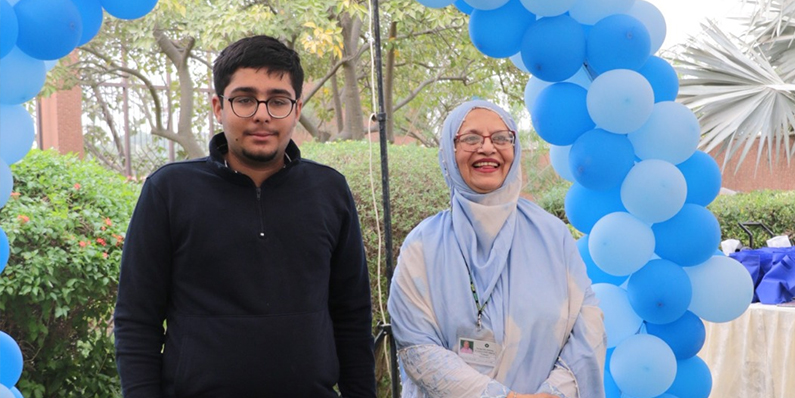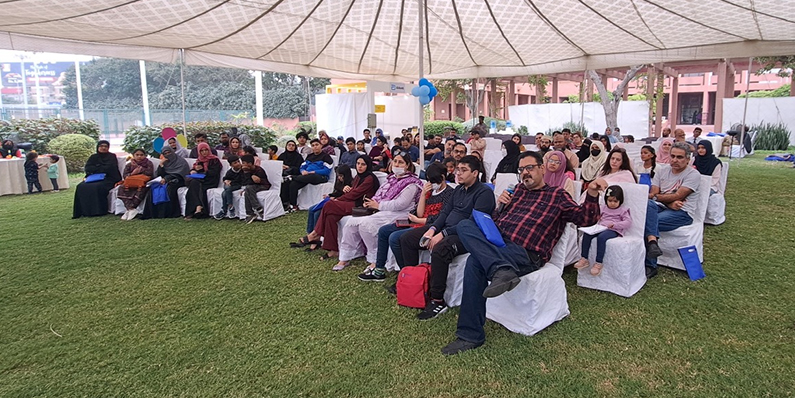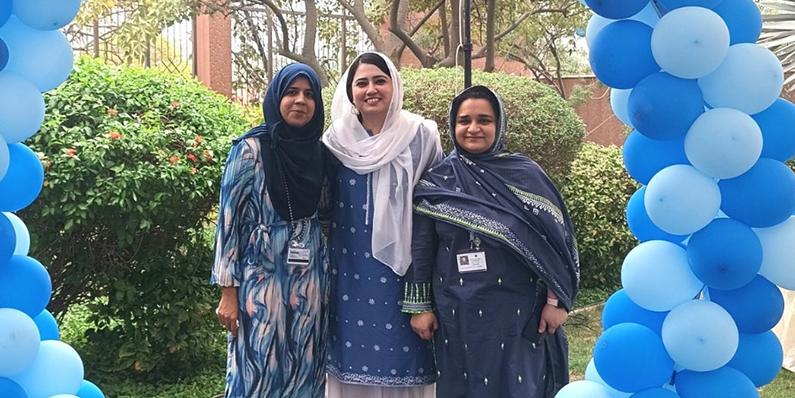‘Why can’t I eat meetha like the other kids?’
Parents with diabetic children share stories on World Diabetes Day
"Why me? Why am I the only one who has to suffer these pricks and needles? Why can't I eat
meetha like others?" This is what Hafsa Badar has been saying since she was diagnosed with Type 1 diabetes at age three. She is ten years old now—but, as her father explained, she still asks him the same questions.
 Dr Khadija with a member of the audience at the Diabetes Day event for parents to share their experiences, November 25, 2023 at the AKU Sports & Rehabilitation Centre.
Dr Khadija with a member of the audience at the Diabetes Day event for parents to share their experiences, November 25, 2023 at the AKU Sports & Rehabilitation Centre.
Mr Badar was sharing what it has been like for his family to support Hafsa at a gathering organized for Diabetes Day at Aga Khan University on November 25. The event was organized by the Endocrinology section of the Department of Paediatrics and Child Health. Nearly forty families came to take part at the sports centre. Sponsors Abbott and Sanofi set up stalls with their products.
“We are immensely grateful to Aga Khan hospital, and particularly to Dr. Khadija Nuzhat, for their invaluable guidance," said Hafa's father. “We should encourage children like Hafsa to see their condition as a source of strength and resilience."
Prof. Khadija Nuzhat Humayun, who heads Paediatric Endocrinology, had organized a panel discussion with specialists for the event. Dr. Muzna Arif, Dr. Fozia Memon, Dr. Maryam Haider and Dr Aisha Sheikh along with dietician Ms. Farah Syed and clinical psychologist Ms. Vardah Baruchi, endocrinologist and geneticist Dr. Salman Kirmani, Vice Chair of Clinical Service Dr. Ali Faisal and Chair Dr. Fyezah Jehan spoke.

“Nothing is not allowed for your children," Prof. Khadija assured the parents. "With the right balance of insulin and carb counting, your child can enjoy their meals." It is not just about checking glucose levels, we also need to emphasise healthy eating habits.
“It's common for children to feel frustrated when their diet is strictly supervised," said Ms. Vardah Baruchi. “Rather than reprimanding them, open a dialogue," she advised. Ms. Baruchi emphasized the need for empathy and compassion, akin to what we offer friends, to be extended to our children, reinforcing the message of understanding and support in the family dynamic.
Paediatric Endocrinologist Dr. Muzna Arif talked about monitoring glucose levels. "Using insulin without monitoring glucose is like driving a truck on a highway blindfolded," she said. “What would happen? An accident. It's important to check glucose levels 2 hours after a meal and a few hours before, to adjust insulin doses accordingly." There are apps where you can upload your glucose reading and it will generate a report automatically. "These apps can also guide you on the insulin dosage for your child," she added.
 (R-L): Dr. Fozia Memon, Dr. Maryam Haider, Dr. Muzna Arif are our Paediatrics Endocrinology team who work with Prof. Khadija Nuzhat Humayun.
(R-L): Dr. Fozia Memon, Dr. Maryam Haider, Dr. Muzna Arif are our Paediatrics Endocrinology team who work with Prof. Khadija Nuzhat Humayun.
Dr. Maryam Haider talked about the importance of physical activity. “Exercise is as essential for a child with diabetes as it is for one without," she stated. She described a young patient who plays cricket for several hours a day. Despite frequent snacking, his blood sugar levels are well-controlled, demonstrating the impact of regular physical activity on diabetes management.
Dr. Fozia Memon addressed parent concerns about sugar-free medicines. "‘One spoon of medicine will not make much difference," she said. "If you are not able to find sugar-free medicine, you can give Panadol and Calpol."
Yes, we do have special instructions if your child has the flu, she said. "We categorize them into minor, moderate, and severe illnesses. Minor and moderate illnesses can be managed at home by ensuring that the sugar level is checked constantly. A low, high, or normal range of sugar is possible; if the sugar is normal, then there’s nothing to worry about. In the case of low sugar, parents get scared and do not give insulin. However, if the child is not given insulin and is under stress, it will increase ketone bodies, and it could eventually develop into ketoacidosis.
"If you want to maintain sugar levels, then keep the target of 100 to 200.’”
Dr. Aisha Sheikh advised, 'When children reach 9-10 years of age, please encourage them to administer their insulin themselves. It's important to give them independence and freedom, as this helps them become more responsible in managing their condition. Controlling diabetes effectively is key to preventing complications. We have observed patients in the UK who have been living with Type 1 diabetes for over 50 years without a single complication."


